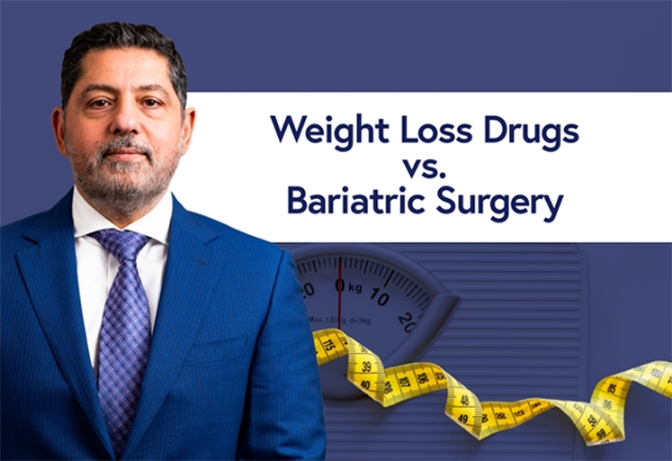Weight Loss Drugs vs. Bariatric Surgery – Which is Right For You?
If you’re trying to lose weight and finding it difficult, you may have considered taking medications or undergoing bariatric surgery. Both of these... read more
Call Us Today (732) 640-5316
E-Waiting RoomWhile bariatric surgery is a highly successful, evidence-based solution to the management of severe obesity, on average 20% of patients will fail to lose adequate weight or regain weight.
A very small number of patients may have complications from a previous procedure that could include a failure to resolve comorbid medical conditions such as diabetes, and anatomic changes that cause symptoms.
Revision surgery involves a modification of your original procedure and may involve conversion to another procedure. The choice of revision or conversion is determined on a case by case basis. Each patient is evaluated to assess causes of failure and the likelihood that they will succeed with revision or conversion surgery.
Your options for revision surgery depend on many different things including the type of initial weight loss surgery you had and your success with that procedure, your individual circumstances, and potential causes for weight regain and failure to achieve weight loss goals.
Laparoscopic adjustable gastric banding is the only bariatric procedure that does not alter the anatomy. This results in lower than average weight loss. In some cases, the patient has achieved successful weight loss but the band has slipped or eroded. Replacing the band or repositioning it can help maintain weight loss.
When weight loss has not been successful or maintained, conversion to either a gastric bypass or sleeve procedure is preferred for satisfactory additional weight loss and a reduction of comorbid medical conditions. The choice will depend on complications experienced from the band including acid reflux, weight regain, failure to achieve weight goals, and the presence of scar tissue which may preclude conversion to a sleeve procedure. In that case a bypass may be the better option.
Been with this group for a few years now. Felt confident enough to come back when needing a revision without feeling judged. Felt the billing department was upfront and easy to work with and always felt comfortable calling in with concerns. The whole team was very helpful to make the process as smoothly possible. I wasn’t a simple straight forward case, but they never made me feel that way at all! From great bedside manner to professional office staff this is the right choice to go
Kristen G.20-30% of sleeve patients develop acid reflux (GERD). Sleeve revision may be an option to minimize reflux. Also, patients with a sleeve may experience an increase in stomach size after a few years. Options may include sleeve revision or conversion to a bypass which will address reflux issues and failure to achieve weight loss goals.
Even with a gastric bypass the stomach will stretch. Corrective surgery is intended to modify the anatomy to increase or restore gastric restriction to stop weight regain and restore satiety sensation and/or recurrence of weight related co-morbid conditions. This approach will reduce the size of the pouch and the size of the juncture between the stomach and the intestines.
Options may include inserting a lap band around the pouch to restrict food intake and removing part of the pouch to reduce the size of the passage to the intestines. Another option is to bypass more of the intestines to reduce the ability to absorb calories. Finally, minimally invasive repair using endoscopy can allow us to tighten the connection between the stomach and intestines to restrict food intake and reduce the absorption of calories.
Bariatric surgery is highly successful, and most patients meet their goals and regain a healthy quality of life. Still there are patients who may need corrections to achieve their goals, even though the original surgery was correctly performed.
Dr. Ragui Sadek is an international recognized authority in minimally invasive bariatric surgery. He and his team perform more than 1,200 complex procedures every year, with few post-surgery complications. Our surgical and bariatric center has received the Bariatric and Metabolic Center of Excellence from the American Society for Metabolic and Bariatric Surgery.

Dr. Ragui Sadek is a premier surgeon who established a state-of-the-art and one of the safest bariatric surgery programs in the state. Dr. Sadek has fellowship training in both laparoscopic/bariatric surgery and surgical trauma/critical care, allowing him to safely perform complex surgeries on patients who have been turned down by other practices. As a Clinical Assistant Professor of surgery at RWJ Medical School & the Director of bariatric surgery program at RWJ University Hospital, Dr. Sadek offers a cutting-edge range of laparoscopic, robotic, & bariatric surgical procedures with a complication rate substantially below the national average.
Dr. Sadek is a Clinical Assistant Professor of Surgery at Rutgers-Robert Wood Johnson Medical School and a Fellow of the American College of Surgeons. Having performed more than three thousand advanced surgical procedures, Dr. Sadek has established a strong patient satisfaction rate and a solid reputation among the surgical community and is renowned as a top physician in his field by International Association of Healthcare Professionals. As a board-certified surgeon, he holds affiliations with the American Society of Metabolic and Bariatric Surgery and the Society of American Gastro Endoscopic Surgeons. More about Dr. Sadek
Stay current with Advanced Surgical & Bariatrics of New Jersey

If you’re trying to lose weight and finding it difficult, you may have considered taking medications or undergoing bariatric surgery. Both of these... read more

Are you frustrated with your inability to lose weight? Tired of being trapped in an endless cycle of yo-yo dieting, over-exercising, cleanses, and... read more